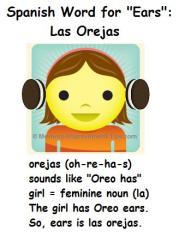
As a child I never had the opportunity to travel abroad with my family. Yet the experience of immersing oneself in another country and culture, especially if I could unpick and overcome the additional barriers of a foreign language intrigued me greatly. I still have that buzz of excitement and, I confess, also nerves as I enter a world initially hidden by an unknown language and make my first attempts at ‘contact´. This is my third year in Chile spending time with my partner’s family during our summer holidays.
They are a wonderful family, exceptionally warm and welcoming however their knowledge of English is minimal and can result in periods of failed interaction as I attempt to communicate with them in the little Spanish that I know. This year in particular I have been determined to make an effort to learn the language more thoroughly. The results have been mixed but I am determined to persevere. Interestingly my own experience as a learner has made me become much more aware of the challenges that my own students face in learning their ‘first’ language. Interestingly I have been struck by some of the similarities as well as the differences between my own language learning experience and that of my students.
Firstly, motivation is the key. I need to and want to learn Spanish better, in order to communicate with my partner’s family. The satisfaction that I gain from successfully being understood and understanding others is paramount. When I am not in Chile my drive to learn the language drops considerably as I am distracted to other pressing demands i.e., my job. Motivation is key for me and clearly also for my students. They have to want to communicate. This of course may be a challenge for my students with autism. Creating scenarios where my students want to or have to communicate is vital in my teaching.
Secondly, I find the extended conversations that I have with my Chilean family rewarding but also often very draining mentally after a period of time. It is as if I am being filled with ‘language information’, yet at a certain point I just cannot seem to take any more in, and like an overflowing cup anything further in the conversation is lost to me. All I want to then do is take myself away for a while just to process it all in. This is the time I may return to my ‘nerd’ roots and spend time with a dictionary, attempting to unpick what had been said and what I could have contributed. It has made me wonder to what extent this may also occur amongst my students. Would it have been better at times to give my students a pause away from the pressure of any further conversation rather than pressing them further? And could it account for some of the challenging behaviour that may occur when this space is not given? I have certainly felt frustrated when the conversation has moved onto a degree that I cannot process anymore.
Thirdly, I have always been an advocate of the power of mnemonics to help me recall vocabulary more effectively. As an adult, learning by rote has never appealed to me. The work of Frederick Bodmer’s Loom of Language first drew to me the power of establishing links between your native language and your ‘target language´, especially if it is originally Indo-European like Spanish. In short, one can often pick up links between many Spanish and English words. My favourite is ‘pan’, bread in Spanish and the connection with ‘companion’, which comes from a person you would be ‘prepared to eat bread with’.
https://www.amazon.com/Loom-Language-Approach-Mastery-Languages/dp/039330034X
Another means is the visualisation link, often the more absurd the better. Tony Buzan’s book, ‘The Memory Book’ introduced me to this approach although the strategy itself is centuries old, going all the way back at least to the Ancient Greeks. An example I use in Spanish is ´perro´ which is the Spanish for ‘dog´. I imagine a dog shaped like a giant pear and smelling like one too!
https://www.amazon.co.uk/Memory-Book-Remember-Anything-Want/dp/1406644269
Together I find these two techniques really invaluable in my vocabulary learning but is there a way that this strategy could be of use to my students? The use of visual imagery to help support language learning for students with autism now permeates all our teaching.
http://www.autism.org.uk/visualsupports
Think of the symbol-supported language systems such as Widgit for example. But is there a way that this strategy of visual learning can be of value to my students? Perhaps through adapting to the needs of each student to personalise and strengthen the ´mnemonic´ link between the word and the concept that lies behind it? How would this like in practice? It is often claimed that students with autism are often predominantly visual learners. As such visual images are often incorporated into our learning strategies, but what more could I do? I would definitely feel this is worth investigating further. Perhaps the result could be the subject of a future blog!